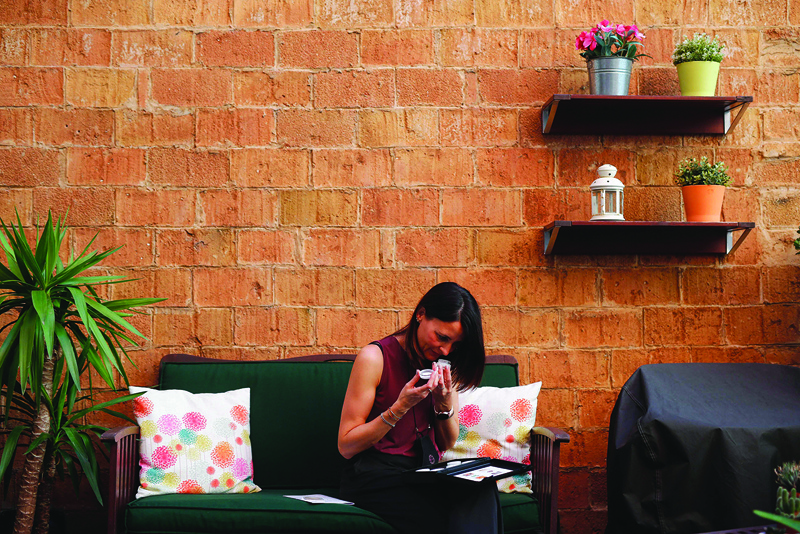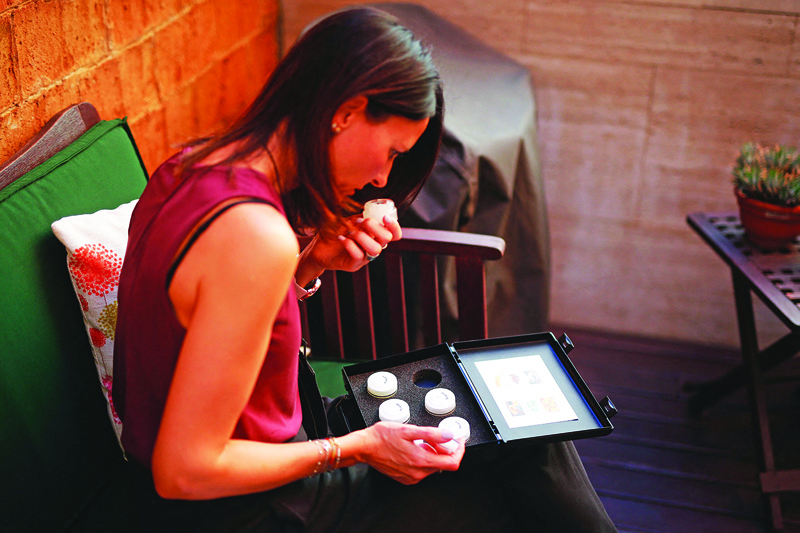 These photos show Spaniard Cristina Valdivia, 47, affected by smell loss due to COVID-19, uses her smell training test kit in Barcelona.-AFP photos
These photos show Spaniard Cristina Valdivia, 47, affected by smell loss due to COVID-19, uses her smell training test kit in Barcelona.-AFP photos
At a hospital in Spain, a doctor holds a test tube under Encarna Oviedo's nose to see if she can smell anything-a full 18 months after she had COVID. "Honey, vanilla, chocolate or cinnamon?" he asks her in the smell unit at the Mutua Terrassa Hospital northwest of Barcelona. "Vanilla?" the 66-year-old replies, her tone unsure. Oviedo is one of an estimated half a million people who lost their sense of smell in Spain after contracting the virus. She caught a mild case of COVID-19 in March 2020 as the virus overtook the country, which soon became one of the hardest hit in Europe.
Doctors are trying to help Oviedo and others to regain the sense through "smell training", a long and slow process that involves sniffing different odors over a period of months to retrain the brain to recognize different smells. "Loss of sense of smell affects around 70 percent of patients who had COVID," says Joaquim Mullol who heads up a smell clinic in Barcelona's Hospital Clinic. A quarter of all people who have lost their smell because of COVID do not fully recover it long after falling ill, he added.
'Everything smelled burnt'
Oviedo is one of around 90 people, mostly "long COVID" patients, who have been treated for loss of smell at the Mutua Terrassa clinic since it opened in February. After a first assessment, they begin a four-month rehabilitation program, which involves a weekly session with a therapist who helps patients to try to identify odors. Oviedo finished the program earlier this year and returns to the smell clinic periodically to see if there has been any improvement. But so far there has been no change.
"I would like to be the way I was before, that I could come home and be able to say how nice my house smells," she says. She now showers more often since she can't tell if she has body odor. For others who lost their smell after catching the virus, when it comes back, it's not quite right. "I started to find that everything smelled burnt, like my nose was over a deep fryer," said Cristina Valdivia, who got sick in March 2020 and lost her smell completely for three months. After endless anguish and several specialist consultations, she went to the Hospital Clinic where she was diagnosed with parosmia, a distorted perception of smell. It was a common diagnosis for recovering COVID patients, and she was told she would have to undergo therapy to fix her sense of smell.
Depression, weight loss
Twice a day Valdivia sticks her nose into six boxes of different odours, taking in their smells to try to regenerate her olfactory connections. She has regained the ability to smell some things such as citrus fruits but others remain elusive. "Coffee is dreadful, it is a mix between gasoline and something that is rotting," Valdivia, 47, says. Patients say lack of smell complicates their daily lives more than people imagine. Valdivia misses the smell of her son. But odours from others register as vile for her.
"If I hug my mother-in-law, my mother, the smell is horrible... it's hard to deal with all of this," she says. Mullol said loss of sense of smell triggers depression and weight loss in some patients. "The nose allows us to smell what we eat, what we drink, to connect with the outside world," he said. "We detect things that can be dangerous, like gas, spoiled food. When we remove that, the person is cut off from the world." - AFP





